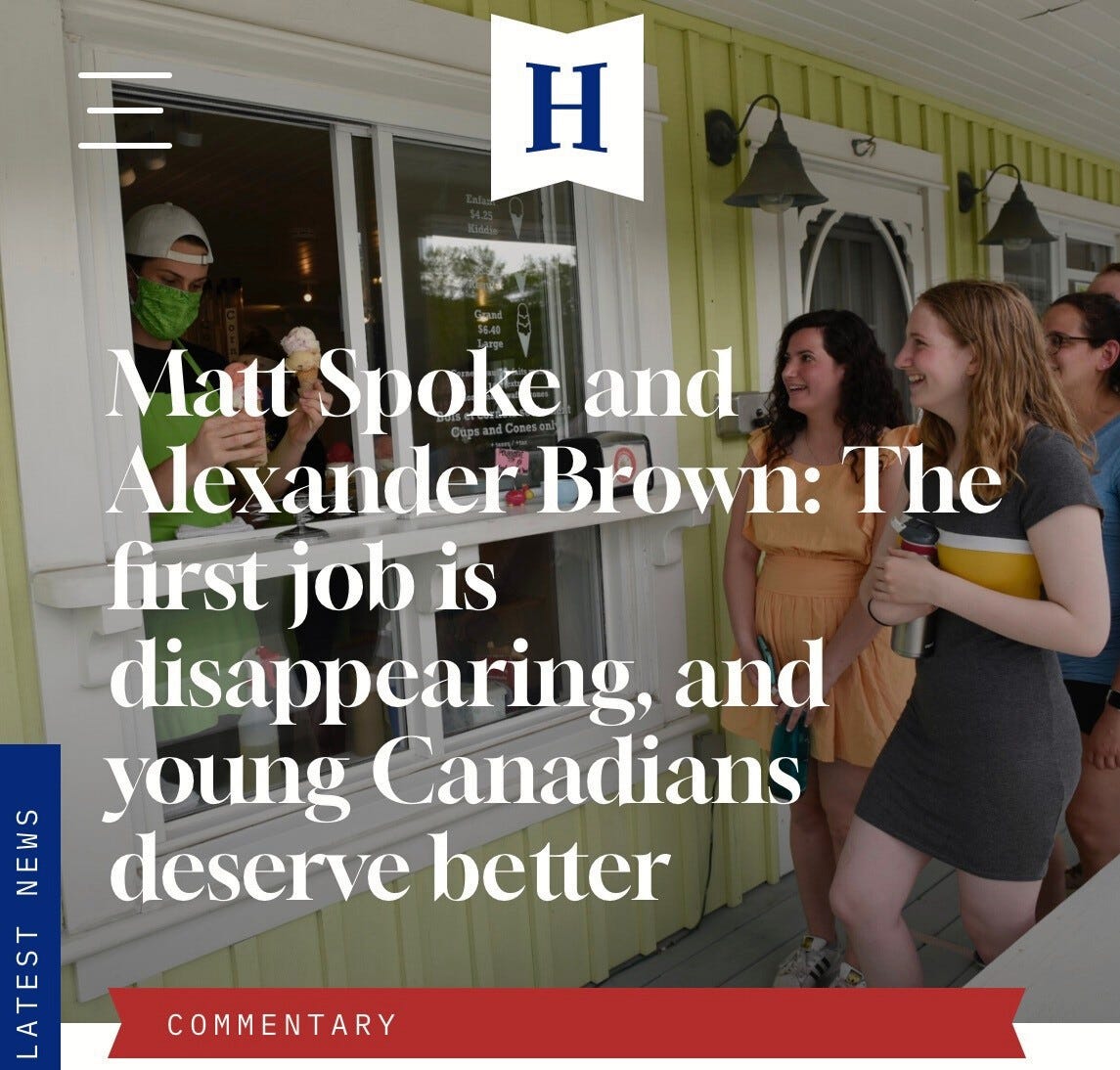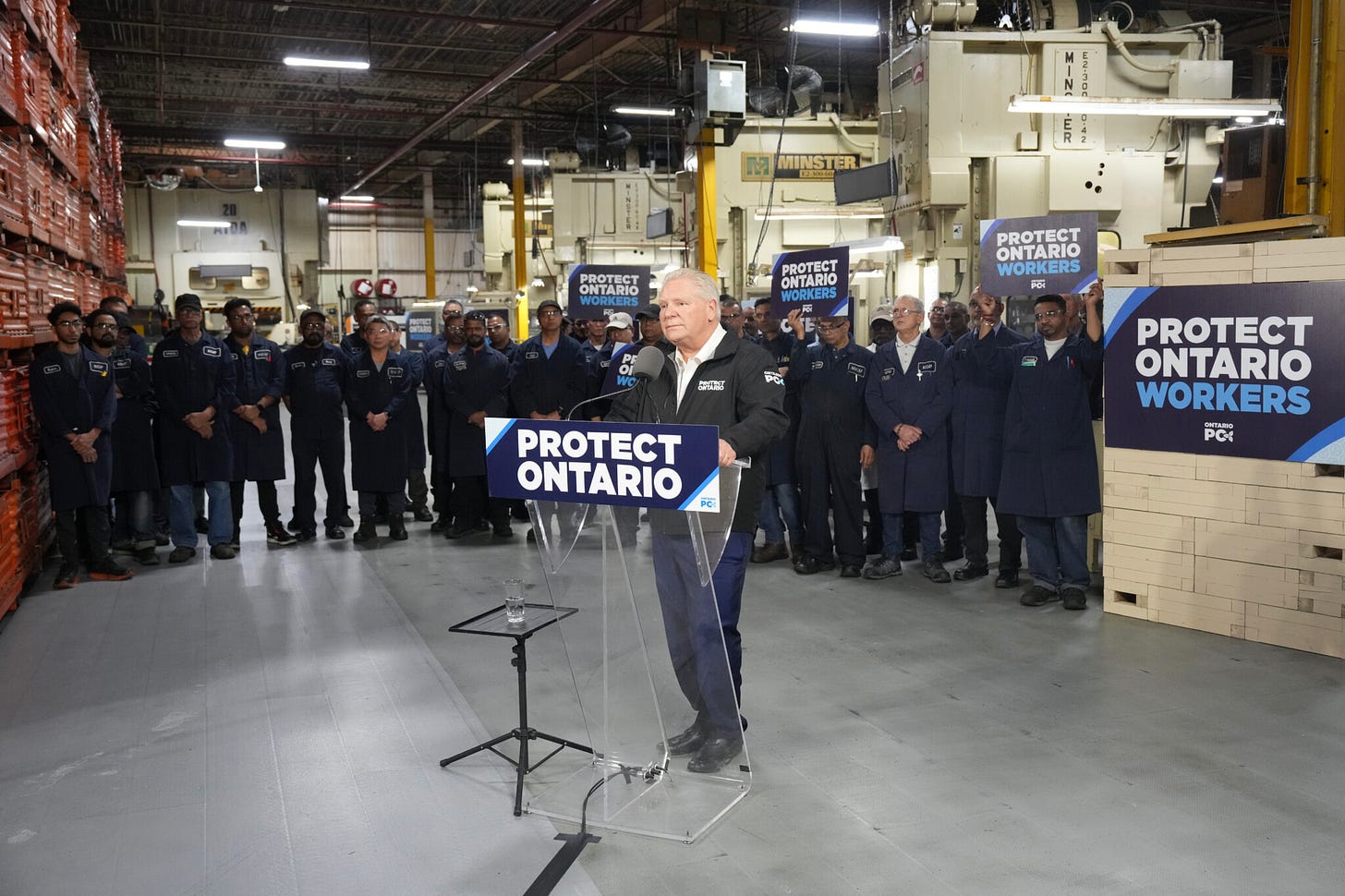The first job is disappearing, and young Canadians deserve better
New in The Hub, along with a win for the good guys.
Ontario Premier Doug Ford is walking back a threat to issue 100,000s of work permits to the province’s asylum seekers during an unemployment crisis.
Did I help make this happen? Perhaps. But there’s no limit to where men and women can go when they don’t care who gets the credit. Doug Ford still has no idea what he’s talking about, and there’s more to come on this shortly.
Hours before today’s walk-back, Matt Spoke and I popped up in The Hub this morning, with an urgent call to start doing right by our 15-24s, who are increasingly unemployed in historic numbers — with bad politicians, with worse ethics, seemingly hoping to keep it that way. There is no time to let them get away with that, nor for their sudden, anti-civilizational, anti-progress lurch back towards mass immigration mania.
I’d encourage you to read this feature, which is not kind to Ontario’s role in this ongoing fiasco, and then I’d ask you to do me a favour, and sign up to the Project Ontario email list, to learn more about the growing, grassroots, cross-organizational effort to better hold conservatives-in-name-only to account.
Back in touch shortly. Pardon the amount you’re hearing from me during the summer slowdown. Big, bad governments haven’t taken these months off of scumbaggery, so neither can we.
-Alex
Matt Spoke and Alexander Brown: The first job is disappearing and young Canadians deserve better
In Ontario, the first job used to mean something. It was your first paycheque, your first team, your first boss. Whether it was working the fryer at a restaurant, standing behind the cash register at the mall, or stocking shelves at the grocery store, these roles weren’t glamorous, but they were formative. They gave young people a sense of independence, good habits, and confidence.
Today, those jobs are quietly disappearing—not because the work has vanished, but because it’s no longer going to Ontario’s youth.
Entry-level positions across the province are increasingly being filled by temporary foreign workers and international students. This is a direct result of federal labour and immigration policy that’s distorting the entry-level market and crowding out local teens. Recent figures from inside Immigration Minister Lena Diab’s department count 3,049,277 temporary residents nationwide, including 129,653 who are now in Canada illegally due to expired permits. That’s in addition to the more than half a million undocumented migrants believed to be staying in Canada, according to a 2024 government briefing note.
Meanwhile, the post-COVID explosion of international student programs has misaligned with Ontario’s actual labour market needs. While career colleges like Conestoga have prioritized revenue-driven international recruitment, they’ve focused heavily on business management programs instead of in-demand fields like health care, skilled trades, or STEM.
This has failed to address a critical labour shortage, all while creating underemployment among international graduates, further clogging the job market for lower-skill roles. At Conestoga, for example, students report significant job scarcity, with many unable to find work despite persistent efforts, reflecting a saturated market that disadvantages both international and domestic youth.
The federal cap on study permits announced in 2024, reducing Ontario’s intake by up to 50 percent, acknowledges this strain. Colleges now face revenue losses and layoffs. This is the result of an unsustainable model that grew too quickly, prioritized tuition revenue over strategic labour market integration, and left Ontario youth struggling to secure early-career opportunities in a system flooded with competition.
These are serious federal problems, but they are being compounded by provincial acts of abdication. Queen’s Park has stood by while Ontario’s entry-level job market has become distorted. Worse, it has layered on provincial policies that make it harder and less attractive for businesses to hire young, inexperienced workers in the first place, all while promoting policies that encourage the employment of newcomers.
Even if Ottawa needs to fix its broken labour visa system, Queen’s Park is not off the hook. Ontario controls the labour and regulatory environment that employers navigate every day, and that environment is failing our youth.
A worsening youth jobs crisis
Youth unemployment in Ontario currently sits at 15.8 percent, above the national average. For teenagers aged 15–19, the rate is even worse at 22.2 percent. That’s nearly one in four teens who want a job and can’t get one. And yet, restaurants, warehouses, and retailers are still hiring, just not locally.
Why? Because Ontario has made it prohibitively expensive and risky to take a chance on an inexperienced worker.
Since 2017, the minimum wage has jumped from $11.60 to $17.60 per hour (effective as of October 2025)—a 52 percent increase in just eight years, with automatic annual escalators locked in by legislation. That’s before you factor in payroll taxes, scheduling requirements, and other employment standards that apply equally to every worker, regardless of age or experience.
These rules assume that all workers are interchangeable; that a 16-year-old working evenings after school should be treated the same as a 40-year-old supporting a household. These policy choices have real-world consequences: businesses hire the candidate who poses the least risk and delivers the most productivity per dollar. And that’s rarely someone just starting out.
The result is a system that prices young people out of their own labour market.
Small businesses—especially in retail, hospitality, and seasonal sectors—used to be the launchpad for young workers. Today, many believe they can’t justify bringing on someone with zero experience at a full adult wage rate. Others streamline operations or automate roles entirely. Most of these employers still need workers, so they pursue more structured and predictable options such as hiring international students or labour through temporary foreign worker streams.
This is the result of bad policy. We’ve allowed federal immigration programs to flood Ontario’s entry-level job market while local youth are sidelined. It is now often easier, cheaper, and more predictable for employers to hire someone on a visa than a teenager from their own community. That’s not smart labour policy, and Ontario can’t keep pretending it’s someone else’s problem.
What Ontario should do
First, Ontario needs to increase its pressure on the federal government to dramatically reform broken immigration programs that have contributed to this problem.
But more importantly, within its own jurisdiction, Ontario needs to make entry-level jobs viable again. There’s a broader conversation to be had about minimum wage policy across the board, but even without overhauling the system, we can and should act immediately to fix how it’s failing young people. That starts by implementing a youth wage that is set meaningfully lower than the minimum wage—say, $12 per hour for workers under 18.
A lower wage floor would give businesses more flexibility to hire for potential, not for age and perceived polish.
Ontario should also consider offering targeted tax relief or payroll incentives to small businesses that hire first-time Canadian workers or employees under the age of 25. If the province can offer tax credits for hiring co-op students and subsidize training programs through employers, surely it can offer similar support to businesses that hire teenagers for their first job.
And just as importantly, we should start treating youth unemployment as a core provincial metric. If we’re serious about growing a resilient, future-ready workforce, we need to care about the civic responsibility we have to those being left out of it today.
The bigger picture
This isn’t a niche issue. It’s a foundational one. A generation that doesn’t get to start working until their mid-20s is already behind. Work builds responsibility, financial literacy, time management, and self-worth. Entry-level jobs do more than just prepare young people for work; they also prepare them for life, placing them firmly on a path towards career satisfaction, economic stability, marriage, starting a family, and contributing to their community.
In an unprecedented moment of technological advancement, online alienation, the potential for radicalization, even lower birth rates, the continued “sick man” in Canada’s economy could be led again by providing hope and a future to the thousands presently at risk of failing to launch.
Right now, be it intentionally or unintentionally, Ontario is prioritizing foreign workers and pushing its youngest workers to the sidelines.
Policymakers got this wrong. We need an urgent course-correction that restores Ontario’s upward social mobility. Let’s rebuild the first rung of the economic ladder and give the next generation a chance to climb.
Matt Spoke is a contributor to Project Ontario, a grassroots political initiative focused on renewing and strengthening conservative leadership in Ontario. It was born from a growing sense among many conservatives that Ontario is at a crossroads and needs a clear, principled vision for the future.
Alexander Brown is also a contributor to Project Ontario and the director of the National Citizens Coalition.





A desperate situation, well described Alex.
The challenge is bad enough with a finite number of entry-level jobs being available. The crisis described above would worsen if the Canadian economy was to slow or go into a prolonged recession. Our largest trading partner has recently achieved trade deals with the European Union and Japan. It is time for the "elbows up" team in Ottawa to get serious about dealing with the world's largest domestic economy. Nationalistic slogans and periodic flag waving will have been purely performative should a new economic arrangement not be finalized with Washington.
Just watched Ford waxing eloquently on Canada being the US biggest trading partner… he seemingly refuses to acknowledge the fact that Canada needs the US alot more than the US needs Canada. As well Ford is constantly singing Carney’s praises meanwhile Carney won’t forfeit the Ontario and Quebec dairy cartel to open it up to US dairy products as Trump demands which is clearly a bone of long contention for Trump as is the total disregard of the fentanyl manufacturing being allowed in Canada and being shipped down to the US and elsewhere!
Meanwhile Carney seems willing to sacrifice other sectors such as soft wood lumber in BC, canola and pot ash for fertilizer in Saskatchewan, oil and gas in AB, the car manufacturing industry in Ontario requiring steel, our aluminum and now recently added is our copper.
Oh it’s soooo not Elbows Up but rather Elbows down for everyone in Canada with 30% tariffs on most goods but he won’t relent on what Trump wants by excempting Ontario and Quebec and their dairy cartel in order to make a deal for Canada! Negotiating for Canada with the US???? No seems as tho Carney the supposed best negotiator ever elbows up seems 99% of his stocks and investments are in 500+ US companies stocks versus the minor 2 Canadian companies he has investments in so he’s clearly working for US interests in order to profit himself and his friends and most definitely NOT for Canada! Including continuing mass immigration now accepting all rejected lgbtq+ from other countries that will kill them to the parents and grandparents of all immigrants already here!
My rant for today, sorry! It’s painful watching the Liberals continuing to destroy our country, to break our spirit our culture and identity politics to separate us add to put us in so much debt we’ll never climb out of, affecting us and all future generations.